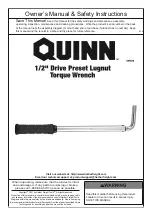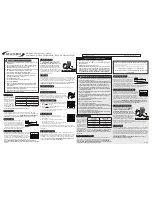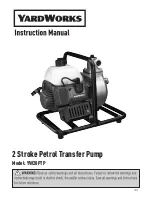
4.3.
Nose Piece Selection:
4.3.1.
The riveter has a 3.2mm nosepiece fitted upon delivery. Other nosepieces are packed along with the tool.
4.3.2.
To remove the nose piece, turn anticlockwise using the supplied spanner (fig.4).
4.3.3.
Replace with the appropriate nosepiece for the rivet being used.
4.3.4.
Use of an incorrect nosepiece will result in the rivet stem failing to release.
4.4
Insert the battery pack into the handle, making sure that it clicks home into the battery latch.
4.4.1.
Removal of the battery involves pushing the battery latch buttons together to release.
5.1.
To insert rivets, place rivet in the pre-drilled hole (fig.5).
5.1.1.
Insert the rivet stem as far as possible into the riveter nosepiece (fig.6).
5.1.2.
Pull the trigger to pull the rivet up. Keep the trigger depressed until the rivet stem is heard to snap away from the head (fig.7).
5.1.3.
At this point, release the trigger; the machine will reverse automatically and release the stem.
6.1.
The head assembly will need to be stripped from time to time to clean and lubricate.
6.1.1.
Before any maintenance, remove the battery to avoid accidental starting.
6.1.2.
Remove the frame head by turning anticlockwise with the spanner (fig.8). This will reveal the jaw case head.
6.1.3.
To remove the jaw case head, turn anticlockwise using the spanner.
6.1.4.
This, in turn, will reveal the jaws, jaw pusher and spring (fig.9).
6.1.5.
Clean with a suitable cleaner and, when dry, apply a little oil to the rear surfaces of the jaws.
6.1.6.
Assemble in the reverse order as 6.1.1. to 6.1.4.
6.1.7.
Clean the casing with a dry cloth only, do not use chemical cleaners.
6.1.8.
Store in a cool, dry place out of reach of children.
fig.4
fig.5
fig.6
fig.7
fig.8
fig.9
Environmental Protection
Recycle unwanted materials instead of disposing of them as waste. All tools, accessories and packaging should be
sorted, taken to a recycling centre and disposed of in a manner which is compatible with the environment.
When the product becomes completely unserviceable and requires disposal, drain off any fluids (if applicable)
into approved containers and dispose of the product and the fluids according to local regulations.
WEEE Regulations
Dispose of this product at the end of its working life in compliance with the EU Directive on
Waste Electrical and Electronic Equipment (WEEE). When the product is no longer required, it must be disposed
of in an environmentally protective way. Contact your local solid waste authority for recycling information.
Battery Removal
Dispose of spent battery packs in an environmentally protective manner.
Under the Waste Batteries and Accumulators Regulations 2009, Jack Sealey Ltd are required to inform potential
purchasers of products containing batteries (as defined within these regulations), that they are registered with
Valpak’s registered compliance scheme. Jack Sealey Ltd’s Batteries Producer Registration Number (BPRN) is:
BPRN00705.
Parts support is available for this product. To obtain a parts listing and/or diagram,
please log on to www.sealey.co.uk, email [email protected] or telephone 01284 757500.
NOTE: It is our policy to continually improve products and as such we reserve the right to alter data, specifications and component parts without prior notice.
IMPORTANT:
No liability is accepted for incorrect use of this product.
WARRANTY:
Guarantee is 12 months from purchase date, proof of which will be required for any claim.
INFORMATION:
For a copy of our latest catalogue and promotions call us on 01284 757525 and leave your full name and address, including postcode.
01284 757500
01284 703534
Sole UK Distributor, Sealey Group,
Kempson Way, Suffolk Business Park
,
Bury St. Edmunds, Suffolk,
IP32 7AR
www.sealey.co.uk
Original Language Version
© Jack Sealey Limited
CP312 Issue: 2(SP) - 21/10/14
5. OPERATION
6. MAINTENANCE





















